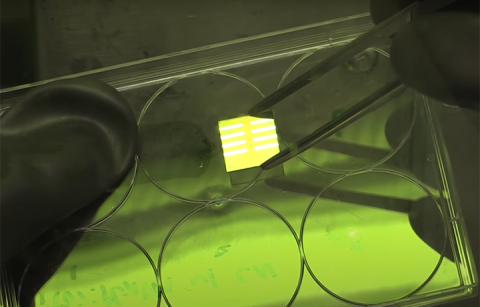
What do chemical engineers working in computing, data, and digital technologies do?
Chemical engineers employ and design data science methods to visualize, analyze and predict chemical and biological properties. Data is obtained in a multitude of ways, ranging from high throughput instrumentation, gene sequencers, to computational simulations. Data science methods include the use and development of software, numerical analysis methods and machine learning amongst others. These approaches enable ChemEs to better understand how systems work, to improve the visualization of scientific data and lastly to solve problems and predict properties more efficiently. Innovations made by chemical engineers cut across computing, data, and digital technologies. ChemE’s have long been involved in creating the essential components of computers like memory and processing chips, as well as advancing quantum communication and computing opportunities. The founder of IBM was a ChemE!
What do chemical engineers bring to the computing, data, and digital technologies field?
Data science is the idea of taking large amounts of data and extracting knowledge and actionable information from those data. The data can come from a variety of sources, such as robotic high-throughput instrumentation, supercomputers and simulations, or gene sequencers and data often needs to be synthesized from multiple sources. A chemical engineer can use knowledge of data science together with the ChemE toolbox of understanding how systems work to create data-informed engineered processes. “For example, chemical plants are highly automated settings in which sensor networks provide continuous streams of data. However, traditional model predictive control techniques often fail due to process complexity or a mismatch between the speed of computation and the response rate required for high performance. In such instances, Machine Learning methods can be used to learn process control rules with a high level of accuracy and millisecond run times. “ For more, see Enabling Chemical Engineering with Data Science.
How do I decide between Computer Science and Chemical Engineering?
Someone who is excited about computing will thrive in both disciplines. However, while CSE is about how computing happens, and ChemE includes aspects of this, the real focus of ChemE is on using tools like computing to solve problems that have a big impact on people’s health, climate and the environment. The scale of data available is a great fit for the systems perspective of chemical engineering and has the power to transform our future.
For example, ChemE’s use the tools of data science, machine learning and artificial intelligence to create new medicines, design and manufacturer clean energy solutions like space-age solar energy materials, and new ways to manufacture everyday products that use less energy, fewer non-renewable resources in a sustainable way. The tools of data science are embedded in a ChemE’s training, for ChemE’s need to know how to manage the data and computing needs of billion dollar semiconductor fabrication facilities with tools like Internet of Things and edge machine learning for real time process control.
Customize ChemE to YOUR interests
ChemE is a cohort-based program, which means you never have to worry about when to take core classes or whether there will be space when you need it. You'll be able to focus on developing relationships with your classmates, faculty members, and advisers, as well as customizing your experience to your interests. While ChemE is a broad degree, we provide guidance to help students identify and pursue their interests while developing the strong fundamental perspective that all ChemEs bring. We encourage students to take ownership over their education to make the most of their time in chemical engineering.
Engineering Electives
All ChemE students take at least 16 credits of engineering electives. Some students choose a broad array of electives and others choose to focus most of their electives in a specific area of their interest, called an optional focus area. Here are some examples of engineering electives that relate to computing and data science.
- CHEM E 375: Chemical Engineering Computing Skills (2)
- CHEM E 481: Process Optimization (3)
- CHEM E 498: Advanced Numerical Methods (3)
- CHEM E 498: Molecular Simulation Modeling (3)
- CHEM E 548: Current Topics in Data Science (1 credit)
- CSE 160: Data Programming (4)
- CSE 163: Intermediate Data Programming (4)
- STAT 180/CSE 180/INFO 180: Introduction to Data Science (4)
- CSE 373: Data Structures and Algorithms (4)
- CSE 410: Computer Systems (3)
- CSE 413: Programming Languages and their Implementation (3)
- CSE 414: Introduction to Database Systems (4)
- CSE 416: Introduction to Machine Learning (4)
Areas of Knowledge
All ChemE students take at least 24 credits of Areas of Impact, including at least 3 credits of DIV, 10 credits of VLPA, and 10 credits of I&S. We encourage students to consider using these credits as another way to deepen knowledge and gain a breadth of perspective on the areas of interest to them. Here are some examples of Areas of Knowledge courses that relate to computing and data science.
- SOC 225: Data and Society (I&S)
- INFO 102: Gender and Information Technology (I&S and DIV)
- INFO 402: Gender, Race and Information Technology (I&S and DIV)
- CHID 370/COM 302: The Cultural Impact of Information Technology (I&S or VLPA)
- COM 303: Social Effects of Technology and Social Media (I&S)
- EDUC 375: Digital Media Literacy (VLPA)
- INFO 370: Core Methods in Data Science (5)
- CSE 412: Introduction to Data Visualization (4)
More data science courses can be found on the eScience Institute site
To talk with a data scientist, visit data science office hours
Student Competitions
C-HACK Over two weeks in January, undergrads complete a Python tutorial and team up to solve a chemical engineering problem with code. In 2021, hackathon participants analyzed, visualized and predicted impurities using DOW reactor data.
Undergraduate Research
Over 70% of BS ChemE students participate in undergraduate research while earning their degrees. Students can do undergraduate research in any engineering lab and count up to 9 credits toward engineering electives for degree requirements. Most research opportunities are not posted on the website. The best way to get involved is to read about the faculty on our research pages and email the professor you're most interested in researching with to see if they have space in their lab. ChemE faculty are on the cutting edge of research in the following areas:
- Bioinformatics & *omics
- Genetic control systems
- Multiscale simulations & modeling
- Predictive control
- High-throughput imaging and analysis
- Molecular data science
- Reaction Engineering
Capstones
All ChemE students take a senior design course or a capstone course. The standard option is CHEM E 486, but many students choose a multi-quarter capstone option such as the industry capstone program.
Examples:
Options, Focus Areas, and Curriculum Plans
Nano and Molecular Engineering Option
The NME option introduces students to nanoscale principles in molecular engineering, provides hands-on experience and stresses the interdisciplinary of this field. Students who complete the option have it noted on their transcript after graduation.
Optional Focus Areas
Students who wish to deepen their knowledge in a specific subject may pursue an optional focus area, combining engineering electives, undergraduate research, study abroad, internship, and capstone experience to create an individualized learning experience that is in-depth in a specific area. Students who complete a focus area will receive a certificate at graduation.
Many students with an interest in computing and data science pursue optional focus areas in Data Science or Computation, Statistics and Modeling.
Where do ChemE alumni go in the field of computing, data, and digital technologies?
ChemE alumni are involved in data science, structures and scalability as well as the manufacture and development of semiconductors, microprocessors and memory.
- Intel
- Micron
- IM Flash
- Amazon Web Services
- Zillow
- Cascade Data Labs
- Tata Consultants
- process engineer
- project engineer
- test engineer
- mechanical engineer
- manufacturing engineer
- materials engineer
- quality engineer
- procurement engineer
- data scientist
- software engineer
- consultant



